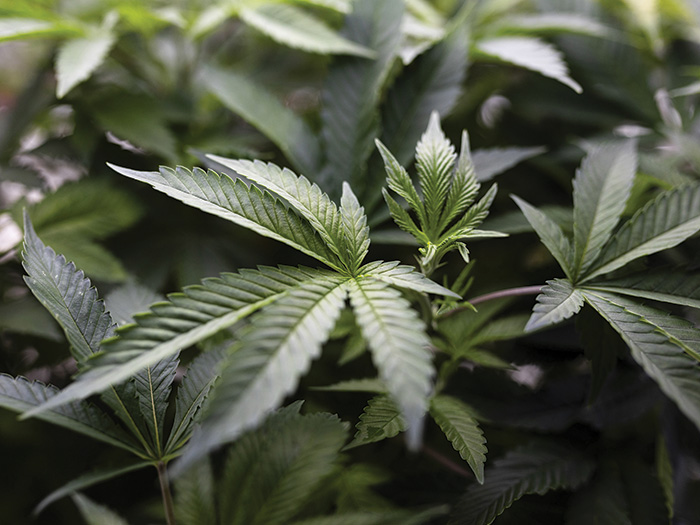Riding the Green Wave: If the Federal Government Ever Gets Around to Legalizing Cannabis, Here Are the Insurance Implications

In his 2015 stand-up special The Comeback Kid, stand-up comedian John Mulaney joked that the government had “[become] like cool parents” when it came to marijuana.
It’s a claim many an onlooker would agree with. Nearly every year since 2012, when Washington and Colorado legalized recreational marijuana use through ballot measures, more and more states have passed laws allowing for medical and/or recreational usage.
Last year, five states passed laws legalizing either recreational cannabis, medical marijuana or both through ballot initiatives, causing some to dub the 2020 election a “Green Wave,” and New York’s recent law legalizing recreational marijuana caused Vox to declare weed “has won.”
Even as states legalize the drug in droves, marijuana remains illegal at the federal level and is still classified as a Schedule 1 drug by the U.S. Drug Enforcement Agency.
This quasi-legal status makes it difficult for recreational cannabis companies to obtain everything from bank loans to the insurance needed to run their businesses due to differing federal and state regulations.
Rather than continue to fear-monger about the dangers of marijuana, Congress has stepped into the role of “cool mom and dad” by introducing two bills, the SAFE Banking and CLAIM acts, aimed at removing some of the federal hurdles for cannabis businesses by offering banks and insurers protection for working with the recreational sector.
If passed, this legislation could further open the already $61 billion industry, bringing more banks and insurers into the fold. Some may abstain from entering the market, however, due to marijuana’s stigma and fears over workplace safety implications.
Despite these concerns, marijuana legalization is expected to continue, with some predicting federal legalization is on the horizon.
Breaking Down the SAFE Banking and CLAIM Acts
One of the primary challenges legal cannabis businesses have faced is an inability to engage in a number of necessary business functions due to the drug’s federal illegality. Currently, federal law classifies all marijuana-related endeavors as criminal enterprises — even those that occur in states where medical or recreational cannabis use has been legalized.
As a result, most state-licensed cannabis businesses have been forced to deal almost entirely in cash, because they can’t set up bank accounts or process credit cards.

Kieran J. O’Rourke, vice president, director of underwriting, Cannasure
Dealing in cash has its risks. All cash businesses are more vulnerable to theft than those that keep money tucked safely in the bank.
It also makes cannabis businesses risky to insure since they could face losses due to theft. Additionally, many insurers fear facing federal penalties due to the drug’s quasi-legality.
“There is no reason, in my mind, why a cannabis or related business operating legally in any state should be denied access to insurance products that any other legal business could get to protect their employees, customers and property,” said New Jersey Senator Bob Menendez, who is a co-sponsor of the SAFE Act.
That’s where the Secure and Fair Enforcement (SAFE) Banking Act and the Clarifying Law Around Insurance of Marijuana (CLAIM) Act come in.
The bills would allow banks and insurance companies to take on cannabis-related businesses as clients without facing federal penalties.
“The SAFE Banking Act and the CLAIM Act, which is about insurance, really is just about allowing those businesses that are already legally operating under state law to be able to operate in a safe, secure environment,” said Congressman Steve Stivers, (R-OH 15th District).
Stivers, who announced that he plans to resign from Congress to serve as president and CEO of the Ohio Chamber of Commerce, is another co-sponsor of the SAFE Banking Act.
The bill was first introduced in the house in March of 2019, where it passed 321 to 103, becoming the first standalone marijuana-related bill to be passed by a floor vote, only to languish in the Senate. It’s sister bill, the CLAIM Act was introduced by Senator Menendez in July of 2019 and died in the Republican controlled Senate without being put to a vote.
Now that Democrats control both chambers of Congress, there is speculation that the SAFE Banking and the CLAIM acts will be easy to pass.
This March, Senators Jeff Merkley (D-OR) and Steve Daines (R-MT) reintroduced the SAFE Banking Act to the Senate, with support from 27 other colleagues. The bill passed in the House 321 to 101 this April. Congresswoman Nydia Velazquez (D-NY) introduced a version of the CLAIM Act to the house in March 2021.
Insurance Implications
The passage of these bills will be critical if the recreational and medical cannabis sectors want to continue to grow. After the house voted on the SAFE Banking Act this April, cannabis stocks rallied during pre-market trade; one company, Cannabis ETF THCX, jumped from -3.56% to 4.6%.
The passage of these bills will be good for the sector not because they will increase demand for recreational or medical marijuana products, but because they will make it easier and safer for cannabis retailers and farmers to conduct business.
“It would allow these mostly all-cash businesses to open bank accounts, apply for financing, accept credit cards from customers, write checks, process payroll and pay taxes. It makes it easier for states to regulate them and alleviates public safety concerns surrounding businesses that operate entirely with large sums of cash,” Menendez said.
Senator Menendez believes that if passed the bills will open up the insurance markets for cannabis businesses with little risk, especially since the SAFE Banking Act would reduce some of the financial exposures. Most cannabis businesses are seeking pretty standard coverages like property and workers’ compensation.
“The pendulum is really swinging in one direction at this point. States are moving in one direction. Public opinion is moving in one direction. And some of those reputational concerns are really starting to fade.” —Jonathan Isaacson, professional liability partner and co-chair of the cannabis law practice, Kaufman Dolowich and Voluck.
In addition to removing federal penalties, the CLAIM Act would prohibit the federal government from incentivizing insurers to avoid participation in the cannabis sector.
There are currently only upwards of 30 surplus lines carriers and a handful of managing general underwriters with known cannabis-related businesses on their books, The National Law Review reports. If U.S. cannabis businesses were insured to similar levels as other businesses, it would bring $1 billion in annual premiums to insurers, according to a 2020 report from New Dawn Risk.
“I believe that’s a major deterrent [the threat of federal penalties], and by eliminating it, we can open up insurance markets to the legal marijuana industry,” Menendez said. “We’re talking about basic products like workers’ compensation, property, casualty and title insurance, for example, that legal cannabis businesses are currently being denied.”
Still, some have speculated that the social stigma surrounding marijuana could be enough to prevent large, publicly-traded commercial insurance companies from entering the space. These concerns are evaporating quickly, however, as more people of differing ages and political ideologies support marijuana legalization.
“There might be one or two more entrants,” said Kieran J. O’Rourke, vice president, director of underwriting at Cannasure, a business that offers insurance services for the sector.
“The fact of the matter is, there is still a stigma. There are still some folks who are dead set against it.”
The Push for Legalization
Whether or not the SAFE Banking and CLAIM acts bring more insurers into the cannabis space, states are likely to continue legalizing marijuana for both recreational and medical purposes.
“The pendulum is really swinging in one direction at this point. States are moving in one direction. Public opinion is moving in one direction. And some of those reputational concerns are really starting to fade,” said Jonathan Isaacson, professional liability partner and co-chair of the cannabis law practice at Kaufman Dolowich and Voluck.

Jonathan Isaacson, professional liability partner and co-chair of the cannabis law practice, Kaufman Dolowich and Voluck
So far this year, New Jersey, New Mexico and Virginia legislatures passed bills, making adult marijuana use legal, and more states are expected to follow.
Another notable entrant into the legal cannabis world is New York state, which legalized recreational marijuana in March.
“It’s important when a state like New York takes that step,” Isaacson said, “but I think it’s part of a larger trend of states moving in this direction.”
“They’re going to set up a regulatory framework, a taxation framework and create unprecedented business opportunities for people who are interested in entering the market,” he continued.
As marijuana legalization becomes more widespread, employers have expressed concerns that allowing recreational use of the drug will create work safety and productivity issues.
“We will have to be even more diligent on ensuring a safe workplace as products like cannabis become more legalized,” said Melissa Burke, PharmD, vice president and head of managed care and clinical at AmTrust Financial, Inc.
These concerns may be overblown, however. No states allow people to work while using marijuana, and in the states where cannabis has been legalized for adult recreational use, there hasn’t been a meaningful uptick in injuries related to impairment. In fact, a study partially funded by the federal government found states where marijuana is legal saw an overall decrease in workers’ comp claims.
“We don’t have any states that say, ‘You can use marijuana while you’re working,’ ” said Sandy Shtab, AVP of Advocacy and Compliance at Healthesystems.
“I’m not aware of any studies, so far, that point to an increase in workplace accidents or impairment where marijuana has either been allowed for medical-use or for adult-use.”
An end to federal prohibition and de-scheduling of the drug is also being touted. Senate Majority Leader Chuck Schumer has said that the Senate will act on marijuana legislation with or without the leadership of President Joe Biden, who does not support full marijuana legalization. The senator expects that a federal marijuana legalization bill will hit the senate floor soon.
Some are skeptical about the likelihood of Congress taking action to end federal marijuana prohibition, however: “I think anybody waiting for Congress to take action might be waiting a really long time. The states have had to take this on themselves, and I think they’ll continue to go in that direction,” Shtab said.
O’Rourke believes that an end to federal prohibition coupled with a de-scheduling of marijuana is what it will really take to open up insurance markets for cannabis business: “That’d be the shot heard round the world,” he said. &










